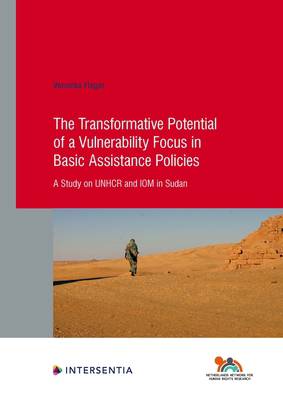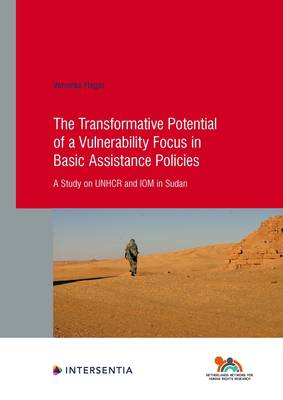
- Afhalen na 1 uur in een winkel met voorraad
- Gratis thuislevering in België vanaf € 30
- Ruim aanbod met 7 miljoen producten
- Afhalen na 1 uur in een winkel met voorraad
- Gratis thuislevering in België vanaf € 30
- Ruim aanbod met 7 miljoen producten
Zoeken
The Transformative Potential of a Vulnerability Focus in Basic Assistance Policies
A Study on Unhcr and Iom in Sudan Volume 92
Veronika Flegar
€ 133,95
+ 267 punten
Omschrijving
The term 'vulnerability' is often used in law and policy to refer to disadvantaged, marginalized or excluded human beings. Being 'in a vulnerable situation', belonging to 'a vulnerable group' or simply 'being vulnerable' are labels that policy makers, human rights advocates and others frequently use when seeking to address precariousness, deprivation, suffering and injustice. Why do we seem so fascinated by this term and its implications? What purpose and effect does the explicit pinpointing of vulnerability have? Does a focus on vulnerability actually help to improve the situation of the most disadvantaged and excluded? If so, how and under what circumstances? With these questions in mind, this book explores how a vulnerability focus in basic assistance policies can contribute to substantive equality and therefore to the realization of universal human rights in the migration context. The book concentrates on the potential that such a vulnerability focus can have 1) to mitigate stigmatization and stereotyping and 2) to facilitate socio-economic participation. To shed light on this potential, the book relies on two case studies, both set in Khartoum, Sudan. The first case study analyzes the vulnerability-focused basic assistance policy at the United Nations High Commissioner for Refugees (UNHCR), while the second case study centres on the vulnerability-focused basic assistance policy at the International Organization for Migration (IOM). The analyses concentrate on the perspectives and perceptions of basic assistance providers (i.e. the caseworkers and their direct superiors) who design and implement the respective basic assistance policies. The book provides deep insights into the policy practice of two UN agencies that seek to provide humanitarian assistance in the challenging operational environment of Sudan. The findings suggest normatively desirable and practically feasible procedures and activation measures that can help to provide just and effective assistance to vulnerable beneficiaries. The conclusions and recommendations in this book can therefore provide inspiration to researchers, policy makers and basic assistance providers well beyond the direct context of the two case studies.
Specificaties
Betrokkenen
- Auteur(s):
- Uitgeverij:
Inhoud
- Aantal bladzijden:
- 464
- Taal:
- Engels
- Reeks:
Eigenschappen
- Productcode (EAN):
- 9781839700392
- Verschijningsdatum:
- 22/10/2020
- Uitvoering:
- Paperback
- Formaat:
- Trade paperback (VS)
- Afmetingen:
- 170 mm x 244 mm
- Gewicht:
- 784 g

Alleen bij Standaard Boekhandel
+ 267 punten op je klantenkaart van Standaard Boekhandel
Beoordelingen
We publiceren alleen reviews die voldoen aan de voorwaarden voor reviews. Bekijk onze voorwaarden voor reviews.











